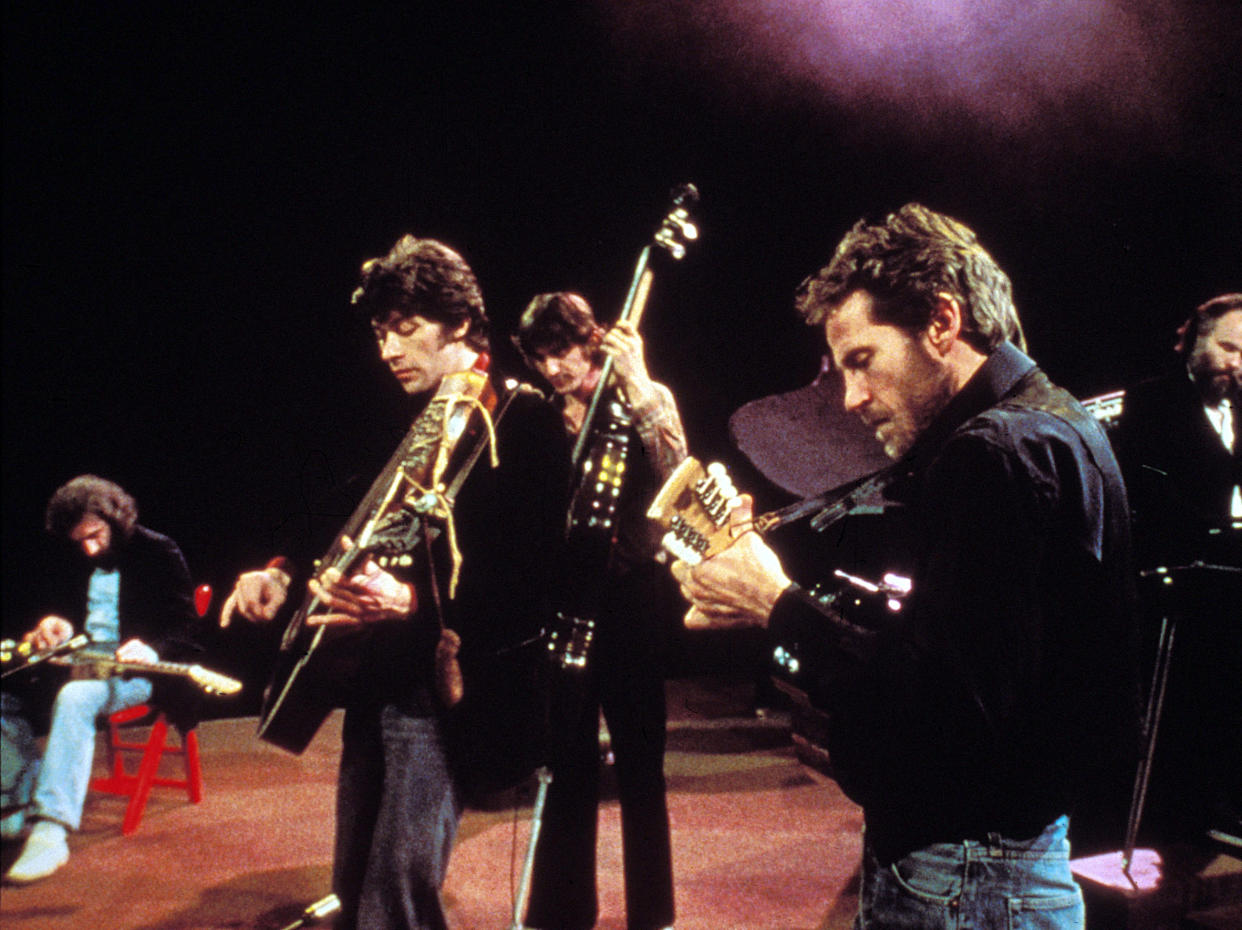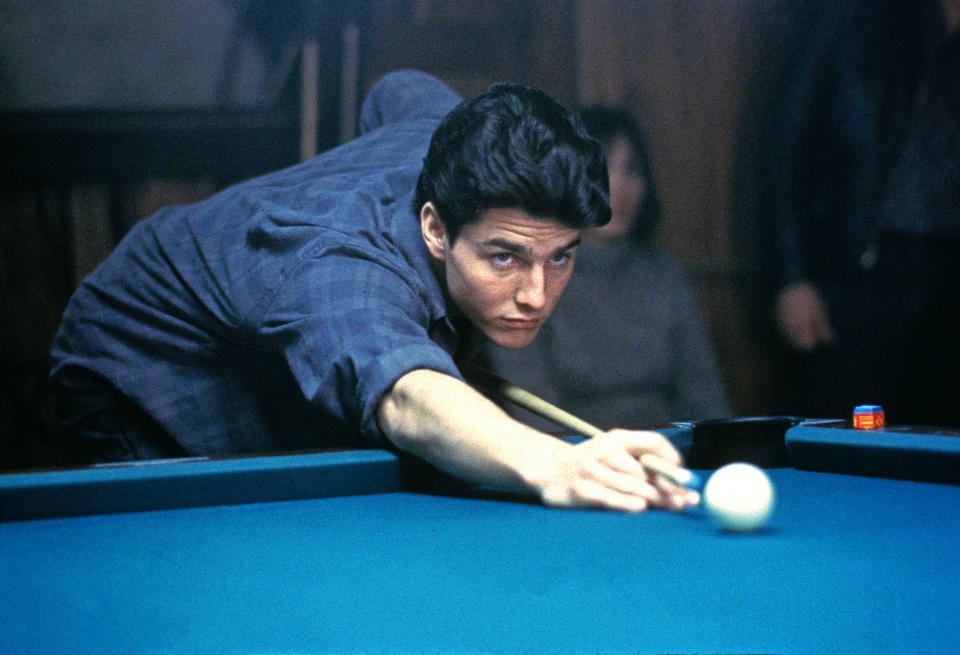‘I Miss Him. Every Day’: Martin Scorsese Reflects on His Decades-Long Collaboration with Musician Robbie Robertson

When Robbie Robertson and The Band performed their final concert at San Francisco’s Winterland Ballroom in November 1976, it was clearly an ending for the group, as expressed in the title of the 1978 film Martin Scorsese made about the event, “The Last Waltz.” While that movie — by virtually any imaginable criteria, the greatest rock and roll film ever made — documented a farewell, it itself represented a new beginning: a collaboration between Scorsese and Robertson that would last nearly 50 years and yield an astonishing series of masterpieces including “Raging Bull,” “The Wolf of Wall Street,” and most recently “Killers of the Flower Moon,” for which Robertson — who died last August at the age of 80 — posthumously scored an Academy Award nomination for Best Original Score.
Robertson’s work in “Killers” is the apotheosis of his partnership with Scorsese, a score that exhibits the passion, variety, and depth of expression familiar from Robertson’s compositions in Scorsese films like “The Color of Money” and “The Irishman” but points in new directions. For Scorsese, it represents the culmination of everything he and Robertson had been working toward since they first met in the mid-1970s. “I suppose I think of it as a culmination for a few reasons,” Scorsese told IndieWire. “First of all, Robbie’s gone now. So in that literal sense, it’s a culmination. And in another sense, I think that over the years our communication with each other ran deeper and deeper — I was able to describe what I wanted in a way that he understood, and he was able to give me exactly what I wanted…or often to surpass it.
More from IndieWire
“Maybe most important of all, though, was the fact that this was a picture about the life of indigenous people, the Osage nation,” Scorsese continued. “I was very interested in Native Americans for many years — it goes back to the ’70s, when I wound up in Pine Ridge for a few days on a project that never came to be. It’s an experience that stayed with me and led directly to my making ‘Killers.’ But after Robbie was gone, I realized that our friendship was a part of that as well. His Mohawk and Cayuga heritage became increasingly important to him over the years, and that had a great effect on me, almost without my knowing it. So in that very important sense, ‘Killers’ was a culmination of our work and our friendship.”
Scorsese and Robertson’s first post-“The Last Waltz” collaboration was 1980’s “Raging Bull,” a film that had no conventional score but needed new music for some key scenes. “The soundtrack of ‘Raging Bull’ was recorded music, the soundtrack of my world when I was growing up,” Scorsese said. “Mascagni, Tommy Dorsey with Sinatra, Nat King Cole, ‘Stornelli Fiorentini’ by Carlo Buti, Tony Bennett and others. I needed some music for the Copacabana Lounge — to be specific, lounge music. So I turned to Robbie and he brought in Garth Hudson, Richard Manuel, and Larry Klein — they all knew exactly what we needed and they delivered. I turned to Robbie because he knew every musical idiom inside and out, and he knew the musicians to turn to.”

Robertson worked with Scorsese again on the director’s next film, “The King of Comedy,” contributing the original song “Between Trains” and receiving a music production credit. His role expanded on 1986’s “The Color of Money” when Scorsese called upon Robertson to not only find songs for the movie but compose the score, something Robertson had never done and didn’t completely understand. “It’s very funny,” Scorsese said. “That was the first traditional score we did together, mixed with recorded music and some new songs by people Robbie brought in, including Don Henley and Eric Clapton. For the score itself, we needed real Chicago blues. So Robbie put together a recording session with Willie Dixon and other musicians orchestrated by Gil Evans.
“So, I was there in the studio, and it was an amazing session, yielded probably about 25 minutes of music, all of it great. So I said to Robbie, ‘OK, now — for this next scene…’ And Robbie said, ‘No, that’s it.’ ‘What do you mean, that’s it?’ ‘That’s the music—you just take it and use sections of it for whatever scenes you want.’ In other words, we had never discussed spotting the picture. So, I understood that we had to figure out a way of working together. Little by little, we did. But, I was very happy with the music for ‘The Color of Money.'”
Robertson continued to work with Scorsese in various capacities on films like “Casino” and “Gangs of New York,” but in the last 14 years, the collaboration grew particularly rich. In 2010, Robertson served as music supervisor on “Shutter Island” and compiled a haunting collection of preexisting classical music to serve as the film’s score — the pieces by John Adams, Nam June Paik, Gustav Mahler, and others are so well suited to the drama that one would swear they were written for it. After that, Robertson helped Scorsese assemble the rollicking onslaught of rock, pop, and punk needle drops in “The Wolf of Wall Street,” worked with music at the other end of the emotional and spiritual spectrum for “Silence,” and composed the brooding, propulsive score for “The Irishman.”
Scorsese agrees that in these recent films, Robertson’s participation was particularly essential. “In each case, his contribution is extremely significant, in vastly different ways,” Scorsese said. “When the soundtrack was curated, he and I would share and talk about music constantly, and every single choice he sent me was carefully thought through, grounded in a real sense of the world of the picture and what it needed. That was the case with ‘Wolf.’ With ‘Silence,’ we also worked with two composers, Kim Allen Kluge and Kathryn Kluge. I didn’t want a traditional score. I wanted sounds based in the natural world that often didn’t even sound like music, that just suggested the presence of music, or something else, something mysterious. For example, what Robbie did was to give me what I needed for something extremely specific: the sound of silence. He took the sounds of cicadas, recorded all over the world, worked with them in the studio, and gave me… the sound of silence.”
By the time of their final two pictures, Scorsese and Robertson had honed their working methods to perfection, resulting in two films that represent each artist at the peak of his powers. “For ‘Irishman’ and ‘Killers,’ where we had the mix of recorded music and scored music, we had reached a place of real mutual understanding,” Scorsese said. “He gave me two scores that were not only integral to those two pictures as actual cinematic elements — really, the heartbeat of the pictures — but I also think that they are two of the most beautiful scores ever written for movies, period.” As Scorsese prepares to make his first feature without Robertson in over 10 years, the loss he has felt since August remains undiminished. “I miss him. Every day.”
The Society of Composers & Lyricists will honor Martin Scorsese and the late Robbie Robertson with the Spirit of Collaboration Award at the 2024 SCL Awards on February 13.
Best of IndieWire
Sign up for Indiewire's Newsletter. For the latest news, follow us on Facebook, Twitter, and Instagram.
Solve the daily Crossword

